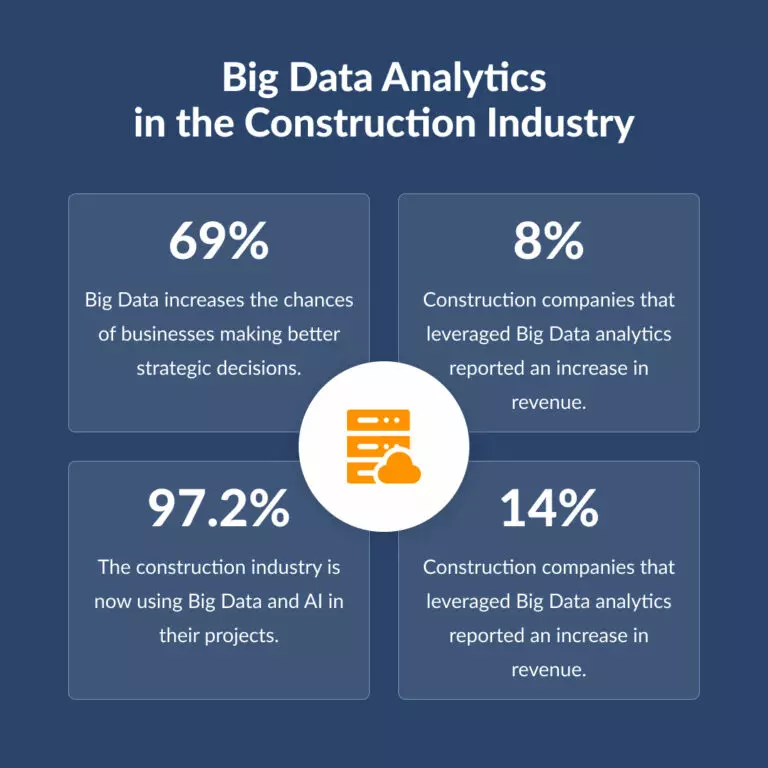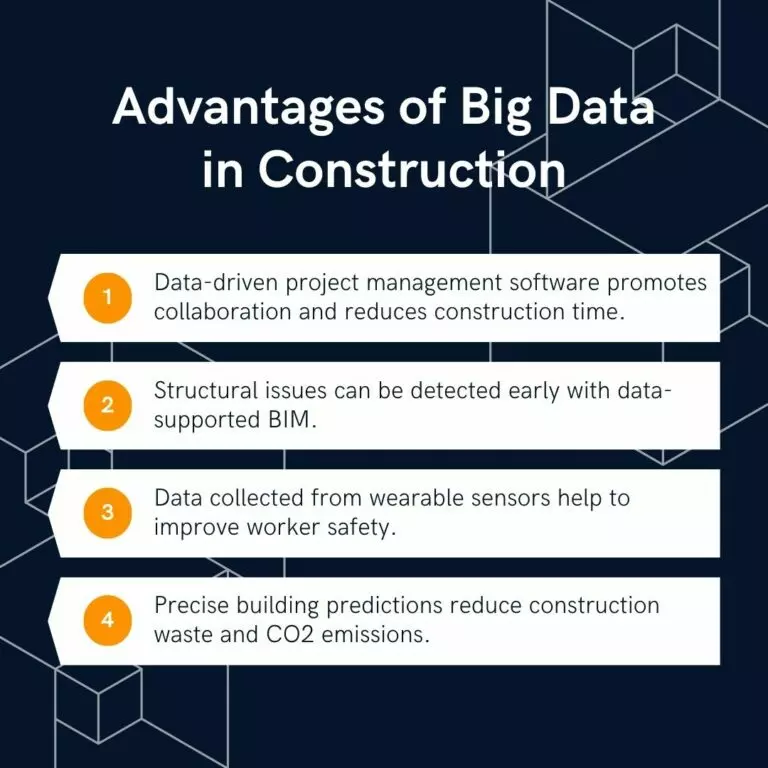.jpg)
The construction industry is a data-intensive industry that generates huge volumes of data. With such a large quantity of data available, finding the relevant information at the right time becomes difficult. Construction project data is usually stored in traditional formats like Paper Documents, Spreadsheets, Local Computer Storage, Email, Physical Archives, Manual Logs, CDs/DVDs, and USB Drives. This is where the role of ‘Big Data’ in construction comes into play. Construction ERP and other CRM software integrate various modules to streamline project management, procurement, scheduling, financials, and more, offering centralized data and real-time reporting for informed decision-making and operational optimization in construction projects.
What is Big Data?
Big data refers to large or complex information sets that need advanced analytics to process and manage. This data comes from cameras, sensors, mobile devices, and traditional or digital sources. Big data engineering systematically analyzes this information, providing precise insights. Construction companies or owners can benefit significantly by incorporating big data to improve efficiency, productivity, and decision-making.

Big Data in the Construction Industry
The construction industry significantly contributes to the economic growth of many countries. It generates vast amounts of data from unstructured sources which leads to inefficiencies as most of the data is not put to the proper usage. The precise utilization of such data for the right purposes is essential to enhance project efficiency and success. According to BDO Global, 98% of construction megaproject data is usually either discarded or not put to the right usage, leading to cost overruns, unoptimized schedules, and resource wastage. Implementing big data analytics in construction projects has many significant benefits, including precise cost estimates, structured workflows, and optimal resource utilization.
How is Big Data leveraged in Construction?
By utilizing the design-build-operate model, big data analytics transforms nearly all the phases of construction projects. Accurate information related to construction project design, estimates, workflows, etc., is used from pre-construction to handover. Here is how the stakeholders can leverage the benefits of big data in each phase of the construction project.
- Construction Planning and Estimation- Big data helps plan finance, schedules, materials, machines, and manpower. It compiles data from current and past projects, identifying potential risks and preventing cost overruns, delays, and resource wastage to help engineers and architects in construction planning. The smart sensors and AI provide insights into the active and idle times that drive in making proper planning for better-informed decision-making.
- Building Design and Modeling- Big data analytics supports Building Information Modeling (BIM) and Artificial Intelligence (AI) helping engineers and architects to optimize project designs. The collected data is utilized to determine probable risks in the design of the building to deliver sustainable design alternatives.
- Building Construction- Big data ensures the smooth execution of construction processes, facilitating collaboration and coordination among team members. Using sensors can alert the project team if activities deviate from the planned path.
- Maintenance and Facility Management- The final stage in the construction process is restoration and maintenance. During the construction process, the information is collected and stored for future use. The maintenance team can utilize the building information in managing and renovating the structure post-construction.

Key Applications of Big Data on Construction Projects
As more construction firms embrace digital technology, architects and engineers integrate big data to revolutionize their practices. This digital transformation journey starts with strategic planning, fostering an innovative culture, and achieving digital maturity through actionable steps and incremental wins. Here is a look at the renowned projects that demonstrate how big data enhances decision-making, minimizes delays, and controls costs.
Effective Change Order Management – Transparency in data is critical for effective cost management and change order handling in construction projects. During the construction of the Shard, evolving designs led to numerous change orders. The availability of detailed records and data analytics allowed the project team to quickly assess the financial implications of each change. This approach facilitates better negotiations with contractors and suppliers, keeping projects within budget constraints. Additionally, comprehensive data collection allows project managers to assess the impacts of changes promptly, predicting delays and additional costs with precision. This predictive capability enhances planning and resource allocation, mitigating the impact of changes on project timelines and enabling accurate forecasting.
Streamlining RFIs – Request For Information (RFI) processes clarify construction document ambiguities but involve meticulous management. The HS2 project faced numerous RFIs, inciting the implementation of a centralized data management system. This streamlined the RFI process, reducing associated delays and ensuring project adherence to schedule.
Enhancing Collaboration to Prevent Delays – Effective stakeholder collaboration is essential to prevent construction delays. The use of a common data environment (CDE) allows stakeholders, including contractors, subcontractors, and regulatory bodies, to access project information in real time. This real-time data sharing enables quicker decision-making and issue resolution, crucial for keeping construction projects on schedule.
Real-Time Project Management – Real-time monitoring and progress tracking enable construction teams to reduce delays, enhance visibility, and make informed decisions. This integration in construction projects allows proactive identification of issues, effective planning, and swift responses to changes or delays. Modern construction projects can minimize delays and control costs effectively by leveraging data-driven decisions.
Transform Construction Projects with Linarc’s Data-driven Analytics
At Linarc, we empower construction project managers with data-driven analytics, leveraging historical insights and real-time information for precise decision-making. Our cloud-powered software collects and processes business-specific data, enabling companies to identify inefficiencies, enhance on-site efficiency and safety, optimize scheduling, and improve reporting processes.
Integrating various project tools and utilizing construction management software centralizes project data, eliminating data silos and ensuring secure, accessible information across the supply chain. Linarc exemplifies this by enabling seamless data input, management, and sharing in one secure location, establishing a single source of truth for project stakeholders.
Explore how Linarc can drive both on-site and off-site efficiency through advanced data analytics. Contact us at Linarc Request Demo


.webp)
.webp)
.webp)

